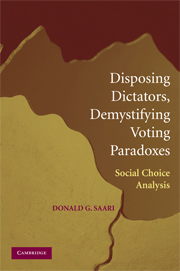Preface
Published online by Cambridge University Press: 24 May 2010
Summary
In part, this book reflects my Condorcet Lectures delivered at the Centre de Recherche en Économie et Management, Université de Caen, Caen, France. Perhaps anticipating paradoxical election behavior of the kind exhibited by the “Nader effect” in the 2000 election, which would have added spice to the already lively discussions, these lectures were purposely scheduled for the week after the November 2004 U.S. presidential elections.
The Condorcet Lectures are named after the prominent eighteenth-century French scholar and politician Marie-Jean-Antoine-Nicolas de Condorcet. As one must expect, a lecture series named after theMarquis de Condorcet must emphasize contributions made to social choice and voting theory. Appropriately, the inaugural Condorcet Lectures were delivered by Kenneth Arrow in September 2002. My lectures were the second in this series, and the third were given in June 2005 by Amartya Sen. What a delight to be sandwiched, perhaps serving as a comma, between these two great thinkers, who have influenced the field of social choice in so many ways. Indeed, certain of their seminal results play key roles in Chapter 2 of this book.
My hosts, Vincent Merlin and Maurice Salles, also organized a small conference centered around the general topic of my lectures – “The Subtle Mathematical Structure of Social Choice.” In order of presentation, the speakers, all eminent contributors to this area, were
Luc Lauwers (Catholic University of Leuven), who spoke on the topological approach to the aggregation of preferences
Bernard Monjardet (Université de Paris 1), who described discrete mathematics in social choice
[…]
- Type
- Chapter
- Information
- Disposing Dictators, Demystifying Voting ParadoxesSocial Choice Analysis, pp. xi - xvPublisher: Cambridge University PressPrint publication year: 2008

